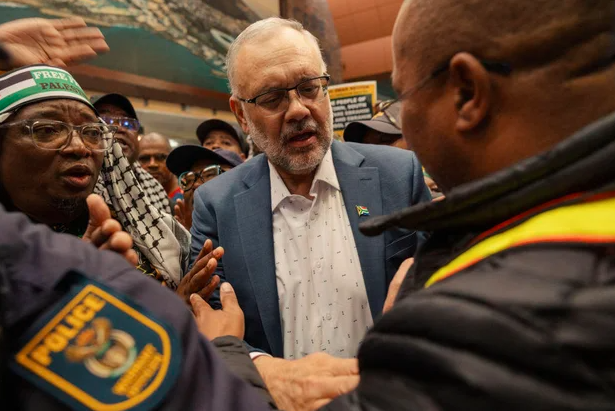Former South African ambassador to the United States, Ebrahim Rasool, has admitted that his approach to diplomacy, guided by the principles of ubuntu, did not succeed during his brief second tenure as the country’s envoy. However, he emphasized that South Africa must always uphold its dignity and values, even when facing pressure from a global superpower.
A Hero’s Welcome in Cape Town
Rasool was warmly received in Cape Town on Sunday by a large crowd of supporters, including former members of his Western Cape provincial cabinet. Many hailed him as a man of principle who had always remained committed to his beliefs.
Ebrahim Rasool
Despite government urging for a low-key reception to avoid further straining relations with the U.S., the ANC’s provincial executive committee defended the gathering, insisting that it was conducted in a respectful and measured manner.
Among those present was former MEC Leonard Ramatlakane, who reaffirmed Rasool’s integrity and leadership.
“Rasool is a respected leader in society, he’s a person who stands on principle. He’s never betrayed any revolution, and therefore, he’s one of us. We welcome him here because we believe he’s a solid leader,” Ramatlakane said.
The U.S. Decision and Marco Rubio’s Role
Ramatlakane also highlighted the role of U.S. Secretary of State Marco Rubio, who was instrumental in Rasool’s expulsion. He pointed out that Rubio had previously been a critic of former U.S. President Donald Trump, suggesting political dynamics within the U.S. may have influenced the decision.
Rubio’s stance on South Africa has often been perceived as hardline, and Rasool’s removal is seen by many as part of wider geopolitical tensions between Pretoria and Washington.
Support from Former Colleagues
Another former MEC, Richard Dyantyi, praised Rasool’s legacy, both in South Africa and during his first tenure as ambassador to the U.S. He commended Rasool for his ability to intellectually articulate South Africa’s position while recognizing the importance of strong bilateral relations between the two nations.
“We welcome him for standing his ground, for intellectually explaining what’s happening in the U.S. and in South Africa, as well as for saying that both countries need each other,” Dyantyi stated.
Navigating a Diplomatic Fallout
Despite Rasool’s expulsion, the ANC in the Western Cape stressed that South Africa must work towards repairing relations with the U.S. The United States remains one of South Africa’s largest trade partners, and maintaining a functional diplomatic relationship is essential for economic and political stability.
The tension between the two nations has been fueled by several factors, including:
-
South Africa’s neutral stance on global conflicts
-
Allegations of arms deals with Russia
-
Diverging foreign policy positions
Rasool’s dismissal adds another layer of complexity to an already delicate diplomatic landscape.
Upholding South Africa’s Values
While Rasool acknowledged that his ubuntu-driven diplomatic approach did not yield the desired results, he remained steadfast in his belief that South Africa should not compromise on its values.
“We must never sacrifice our principles, even when facing pressure from a global superpower,” Rasool emphasized.
His words resonated with many of his supporters, who see his return as a symbol of resilience and integrity in the face of political adversity.
The Road Ahead
As South Africa navigates the fallout from Rasool’s removal, there is growing recognition of the need to strike a balance between sovereignty and diplomacy. While mending fences with the U.S. remains a priority, there is also a push to ensure that South Africa’s foreign policy remains independent and value-driven.
For now, Rasool’s return marks the end of one chapter in his career—but possibly the beginning of another as South Africa continues to define its place in the evolving global order.

